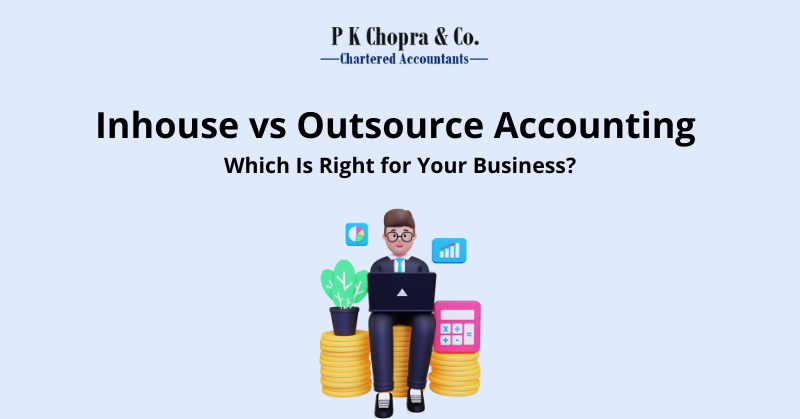Inhouse vs Outsource Accounting: Which Is Right for Your Business?
Outsourcing vs In-house accounting management is a question that plagues many early entrepreneurs today.
Many business owners are keen to expand their businesses however, along with that growth comes a lot of challenges, especially in the area of accounting.
Weighing the pros and cons of Outsourced Vs In-House accounting compliance can be tricky. Depending on the size and complexity of your business, there are a few things to consider before making a decision.
Stick with this article to learn more about both and know which accounting is best for your business.
Why do you need Outsourced Accounting?
One side is outsourcing accounting and bookkeeping services. If outsourcing your accounting work, you contract an outside firm or an individual to manage your financial statements and books.
It will free your time to concentrate on other aspects of your business. There’s no need to fret about reconciling your accounts when you outsource your accounting
Additionally outsourcing your accounting could reduce your expenses
The accounting process is done internally with your employees. Companies that manage their accounting internally use internal employees to keep accounts and to reconcile the financial statement.
Also, you can keep track of your financial health regularly. This will help you to make better decisions.
Why do you need In-house Accounting?
Another side of the coin is In-house accounting. It is doing your accounting internally with your staff. Businesses that handle their accounting in-house use their employees to maintain their books and reconcile their financial statements.
Your company have complete control over your finances. You also can monitor your finances regularly, which can help you make better business decisions. Still, on the other hand, it can increase the cost by including specific staff in the company, salaries, hiring and training, and much more
Weighing the Pros and Cons of Outsourced Vs In-House Accounting
Now that we’ve explored the advantages and disadvantages of outsourced and in-house accounting, it’s time to weigh the pros and cons to see which is right for your business. Consider the following factors:
-
- Cost of Option
The cost of outsourcing accounting services depends on your business’s complexity, the number of transactions you have, and the cost of maintaining an in-house accounting department, depending on how many employees you need to complete the work.
In-house accounting can be more expensive than outsourcing, especially if you want to consider the size of your company, the complexity of your accounting, the cost of accounting software, the cost of hardware, and the cost of training. Outsourcing can save you money, but only if you find a reputable and affordable service.
- Cost of Option
-
- Confidentiality
Outsourcing your accounting makes you worry-free and confident that your information will be confidential. Accounting firms are required by law to maintain the confidentiality of their clients. When you keep an in-house accounting department, there is a risk that your information could be leaked if your employees are not adequately trained in data security.
- Confidentiality
-
- Hiring And Training
Hiring and training in-house accountants can be expensive. You will need to pay for their salary, benefits, and training. Outsourcing accounting services can be less costly since you will only pay for the services rendered.
- Hiring And Training
-
- Compromise in Work Quality
Outsourcing your accounting makes you confident about the work quality. Businesses can often get a higher rate of work from them, as they specialize in accounting and have more experienced staff. If you find the outsourcing firm is compromising with your work, you have every right to change and choose another company.
The quality of work you receive from your in-house accounting department depends on the experience of your employees. If you have inexperienced employees, you may need to spend more time.
- Compromise in Work Quality
-
- Accuracy and Effectiveness
Outsourcing accounting can enhance the precision and effectiveness of your financial reports. If you outsource your accounting needs, experts will be in charge of the books, resulting in less error margin.
In-house accounting can also be accurate and effective. Still, when your staff needs to be more experienced, their level of attention may skip some crucial data, which can be an additional cost for your business.
- Accuracy and Effectiveness
-
- Reporting/Synchronizing the Deliverable
Outsourced accounting and bookkeeping can give you more accurate and timely reports. You can access the latest software and technology when you outsource your accounting. This can make generating reports easier and identify areas that need improvement. In-house accounting can also provide accurate and timely information. This can be done by having someone in charge of regularly reconciling your books or using accounting software, but you may need to invest in additional software and training to get the most out of your in-house accounting team.
- Reporting/Synchronizing the Deliverable
Overall
In-house accounting can also be accurate and effective. Still, when your staff needs to be more experienced, their level of attention may skip some crucial data, which can be an additional cost for your business.

